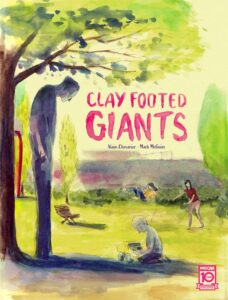Extremely well-meaning but — and I hate to use this word because of the way it’s morphed so far from its more neutral original meaning — problematic.
 Pat is a 40-something American academic living in Montreal. His wife Ester has an important job, so he does his fair share of housework while they raise their two children. He’s recently started dreaming again about being a basketball star as he was in college, even as his good friend Mathieu tries to get him to join Mathieu’s own far less competitive sports league.
Pat is a 40-something American academic living in Montreal. His wife Ester has an important job, so he does his fair share of housework while they raise their two children. He’s recently started dreaming again about being a basketball star as he was in college, even as his good friend Mathieu tries to get him to join Mathieu’s own far less competitive sports league.
Because the nature of her job requires travel, Ester has to go away for a few days for work. As he’s minding the kids solo, Pat loses his temper at his youngest, Sam, for going through a box of slides Pat’s dad recently sent him. In order to make up for turning into a grizzly bear, Pat shows the slides to his kids, and finds himself drawn into their portrayal of his father as a decorated young soldier home from Vietnam. His dad has never wanted to talk about that time in his life, preferring to drink instead of engage in meaningful conversation. His mother isn’t much better, weighed down as she is by a burden of shame around her failed marriage to his dad and the circumstances surrounding it.
But when Sam gets into a fight at kindergarten one day, Pat begins to wonder whether the anger he and his father both carry around in them is perhaps hereditary via epigenetics. Soon, his interest in finding out what really happened to his dad in Vietnam turns into an obsession that threatens to destroy the very family he claims to be trying to protect. Will Pat be able to reconcile his past with his present in order to save his and his children’s futures?
So this all sounds terrific: I am always for people really coming to terms with their traumas and the cruelties inflicted on them by their pasts and upbringings in order to work on themselves and how they treat other people in turn. But oh my God, Pat was so infuriating for so much of the book. While he comes by his flaws honestly — his parents are disasters who can barely take care of themselves, much less raise kind, confident kids — it still makes for exasperating reading when he’s such a weirdo to his own wife and kids. It’s awesome that he does his share of the housework, but he takes an almost passive-aggressive pride in being inefficient at most of it, as if that then justifies his frustration at having to do the work at all. Like, you either need to get good or stop being so uptight about stuff like asking for help (but also his youngest is in kindergarten, so how many years has he had to practice?!)
Mathieu, by contrast, is far more well-adjusted when his performer wife has to take off for days, if not weeks, to pursue her career. I just feel that, in the grand old year of 2024, it’s odd to see men want to be applauded for things women have done for centuries. Why should I pretend to appreciate their discovery that traditionally female roles have sucked since time immemorial? Can’t we just appreciate that it’s better for the person more suited to the role to take it on, even if it means the mortification of the ego for the common good? And can’t we then work together to make all roles more fulfilling and respected? Patriarchy has long undervalued traditionally female pursuits, and while it’s nice to see men finally understand that these jobs are hard and often thankless, the best way to deal with this is to try to elevate everyone in your situation, not whine about how you’re the one in that position now.
My best girl texted me just yesterday that “[we] need to stop worrying about hurting [the feelings of] the fragile white men in our lives” and this book reinforced that in a way that I’m not sure the creators intended. Yes, I’m sympathetic to your experiences, but no, I don’t think they make you special. I’m guessing Clay Footed Giants is just not meant For Me but would land better perhaps with men chafing against not taking dominant roles approved by the patriarchy (looking at you, Cannon.) This book does suggest that the enforcement of those roles only leads to broken, unhappy people and relationships, which: true. And I very much appreciated the inclusion of Bobbi’s prescient warnings about taking epigenetics too, too seriously as a determinative factor.
Some of the blame for the awkwardness of this narrative lies in a number of weird chapter transitions, and possibly translation choices. Readers are forced to guess the where and who of the particulars far too often, which makes for a confusing read. That aside, the pencil art is quite good, and the inclusion of the photographs inspired. I just feel like the story isn’t complete yet, not until Pat (i.e. Mark McGuire, one of the co-authors) has a few more years of reflection under his belt. As a graphic novel inspired by their own lives, this book is laudable but feels a little undercooked. I’d definitely be interested in hearing how the creators feel after more time has elapsed and they’ve been able to grapple with the fallout from the events chronicled here better.
Clay Footed Giants by Alain Chevarier & Mark McGuire was published October 8 2024 by Mad Cave Studios and is available from all good booksellers, including
